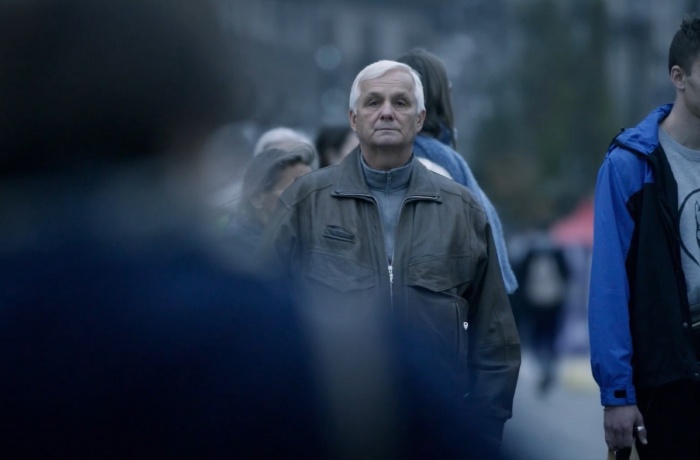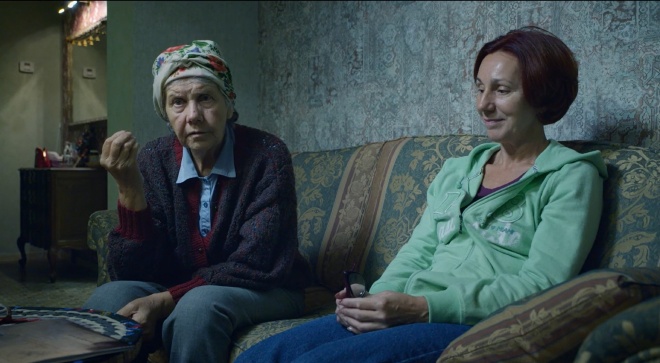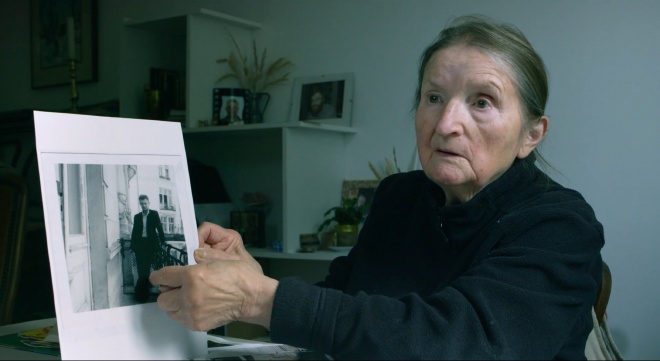People’s fates through the lens of totalitarian system: the screening of The Kyiv Files in Kherson
People’s fates through the lens of totalitarian system: the screening of The Kyiv Files in Kherson

On November 30, the screening of the film The Kyiv Files by Dutch director Walter Stokman took place in Kherson. It was the closing film of the 21st Travelling Docudays UA in the regional center. The Travelling Docudays UA also interviewed the director who shared his thoughts on the influence of the Soviet Union on Ukraine.
Stokman has been working on the film for several years. The inspiration to document the stories of individuals under surveillance during the Soviet era struck him after reading an article about the KGB archives declassified in Ukraine in 2017. He explained, “I aimed to depict what it means to be under government surveillance. What impact can a system, where everyone suspects one another and no one can trust even their own colleagues, friends, or family, have on people? Perhaps this is the very essence of what you are fighting against: the dictatorship of Russia, which fundamentally remains the Soviet Union.”
The screening of The Kyiv Files at the Kherson Educational Center “SVOYE” was moderated by historian and co-founder of the LEGIO HISTORICA festival Yevheniy Shatilov: “Walter Stokman did a great job of finding the protagonists and filming them over an extended period. In addition to their stories, the film highlights the revolutionary changes in our understanding of historical events that have occurred since 2015, following the passage of the decommunization laws.”

Photo: a still from The Kyiv Files film.
The film recounts the experiences of Soviet times, when everyone's life was filled with anxiety and distrust due to the constant threat of being hunted down and punished. It delves into themes of hypocrisy, servitude, control, and fear. It illustrates how the totalitarian system, through the actions of secret services, destroyed lives, orchestrated political persecution, and operated without any ethical constraints, even going so far as to photograph intimate scenes involving its agents.
The audio recordings that serve as narrations in the film are unedited fragments from KGB files. The camera focuses closely on the documents stored in these once-secret files: letters, photographs, and negatives. The video combines footage of a modern city with historical chronicles from that era.
The film is composed of three stories. The first story is about Dutch tourists, Evert Reydon and Low De Jager, who were recruited by their country's intelligence service, delving into the realm of espionage. The second story concerns the persecution of the dissident family of Vira and Vasyl Lisovyi from Kyiv, who were under constant surveillance after returning from the camps. The third story follows Regina Chevraque, a Frenchwoman with Ukrainian roots, illustrating how the KGB recruited individuals and highlighting the absurdity of their suspicions.
Tourists from Amsterdam
In the summer of 1961, two Dutchmen, Evert Reydon and Lov De Jager, traveled through Ukraine in an old Renault. They posed as tourists but secretly photographed military installations for their intelligence.
The KGB began surveilling the men as soon as they entered the USSR. The case files contain a detailed account of the surveillance on the foreigners. On their return journey, at the Czechoslovakian border, they were arrested. Confiscated from them were maps, a diary with intelligence data, 30 rolls of film, four cameras, a telephoto lens, two binoculars, and other items. They were sentenced to 13 years for espionage. After nearly two years of imprisonment, they were released.
De Jager avoided all contact with people for the rest of his life, living as a recluse in a trailer. According to KGB records, he agreed to cooperate with the Dutch intelligence service out of curiosity. He passed away in the summer of 2022.
Vira and Vasyl Lisovyi
Vira Lisova, the mother of the current Minister of Education and Science, Oksen Lisovyi, came under KGB surveillance in 1974. In her file, she was given the codename “Tyha” (Silent). An educated Ukrainian woman, she previously worked as a laboratory assistant at the Institute of Pedagogy of the Academy of Sciences of the Ukrainian SSR. She was suspected of “nationalist beliefs and the possession and distribution of anti-Soviet documents.”
Vira Pavlivna explains that she received her codename because she spoke to the KGB officers calmly and with dignity: “I worked in a school, and it was important to me that the children became conscious Ukrainians, not just Soviet citizens,” she says.

Photo: a still from The Kyiv Files film.
In 1972, her husband, Vasyl Lisovyi, was convicted for nationalist activities after he reacted to the repressions against Ukrainian intellectuals by writing a letter to the Central Committee of the Communist Party. The very next day, the authorities came for him. Lisovyi served seven years in a high-security camp and three years of exile in Siberia. After returning to Kyiv, his family struggled to find employment – a common difficulty for former prisoners. They were constantly under surveillance, with agents placed nearby, neighbors informing on them, and their phone tapped. Friends who visited the Lisovyi family communicated through written notes, which they would then burn.
Regina Chevraque
Regina Chevraque is a French woman from a Ukrainian immigrant family. Regina’s parents had moved to France, but in the mid-1960s, she came to the Lviv region, to Sambir, to find her relatives. The KGB began surveilling her, suspecting her of being a spy.
In the case files, she was referred to as “Courtesan.” A student Bohdan Shykul, who spoke French, was tasked with dating Regina and observing her behavior in order to uncover any potential ties to intelligence services.
Regina fell in love, and she believed that Bohdan did, too. “I think it was love at first sight. We kissed,” she recalls the beginning of their relationship in the film.
One time, Bohdan brought Regina to his friend’s apartment, where they spent part of the night. She recalls her astonishment with the fact Bohdan did not fully undress when they were together, which she found a bit strange. It later turned out that the KGB had taken photographs of the couple in the “friend's apartment”; those pictures were kept in the case file.
Bohdan Shykul declined the invitation to meet with the film crew, stating over the phone that he had indeed worked for the secret service because “those were the times.”
Initially, Regina did not fully grasp the repulsive nature of the situation. While flipping through the photos, she still reminisces warmly: “It was a good adventure.” She wonders how she could have attracted the KGB's attention: “Where did they get these crazy ideas? They really had a lot of free time in the USSR.” But a little later, she says, “When you see Bohdan, tell him he's a bastard.”
The Soviet secret services found no evidence that Regina was involved with French intelligence.

Photo: a still from The Kyiv Files film.
At the end of the film, a former KGB officer, who claims to have been involved in intelligence forecasting, takes the floor. This is another significant achievement of the director: the man tells about the methods of the secret service in noticeably harsh terms. For instance, he explains how he could exert pressure on a student through agents who were also teachers, presenting her with a dilemma: either she would not be allowed to study, or she could continue her education under the condition of cooperation. “We called it ‘recruiting with dependence,’” says the former Soviet secret service representative.
Kostyantyn Solodukhin from Kherson, who participated in the discussion after screening, compares the plot of The Kyiv Files with the book of memoirs by Vitaliy Vrublevskyi, the assistant to the First Secretary of the Central Committee of the Communist Party of Ukraine, Volodymyr Shcherbytskyi, who in 1993 wrote a book about his patron titled Volodymyr Shcherbytskyi: Truth and Myths.
“He describes a story involving Lina Kostenko (a poet and dissident from the 1960s - author’s note). She approached Vrublevskyi because her daughter was having difficulties gaining admission to the university. Kostenko asked Vrublevskyi to intervene, but he said he could do nothing. Even if you were a party official, you were not protected in any way. In high party offices, almost all the barmaids and cleaners were KGB agents. You were constantly under surveillance and scrutiny. Any deviation from the expected behavior could result in swift repercussions.”
Yevheniy Shatilov, in his turn, told about the work of Oksana Yurkova, historian from the Institute of History of the National Academy of Sciences of Ukraine: “Oksana primarily studies the academic community from the 1920s and 1930s. She told me that only seven people would attend the meetings of the department of the All-Ukrainian Academy of Sciences. Five of those people would report on the meeting to the security services. In the case of Mykhailo Hrushevskyi, there were 40 agents who reported on him. Public figures were surrounded by them.”
The film The Kyiv Files can be considered a symbolic conclusion to the 21st Travelling Docudays UA. This year's festival theme was “10 years of a three-day war that has lasted three centuries.” It reflected on historical memory, its fragility, and the constant attempts by adversaries to alter and rewrite it. It addressed the cyclical nature of history, the preservation and search for identity, as well as the liability and punishment of war criminals and the new architecture of security.
Author: Iryna Bulanenko
Title photo: a still from The Kyiv Files.
The 21st Travelling Docudays UA is supported by the Embassy of Sweden in Ukraine, the Embassy of the Kingdom of the Netherlands in Ukraine, and International Media Support. The opinions, conclusions or recommendations do not necessarily reflect the views of respective governments or charitable organizations of these countries. The author(s) of this publication are solely responsible for its content.












